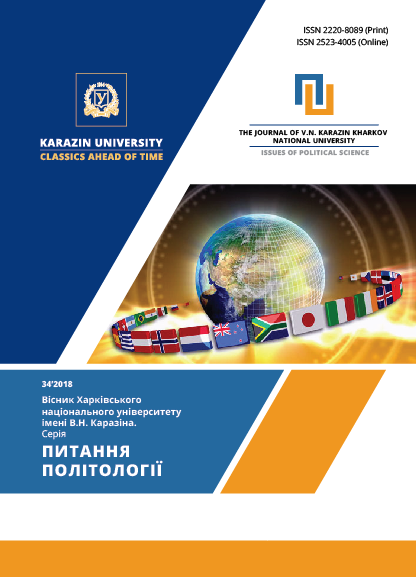СУЧАСНІ ПІДХОДИ ДО ДОСЛІДЖЕННЯ ДЕРЖАВНОГО СУВЕРЕНІТЕТУ В ІНТЕГРАЦІЙНОМУ ДИСКУРСІ ЄВРОПЕЙСЬКОГО СОЮЗУ
Анотація
Проблема збереження державного суверенітету країнами-членами Європейського Союзу була актуальною з моменту створення об’єднання. Тривалий період продов-жувалися дебати навколо проблеми співвідношення суверенітету та інтеграції. Наразі цим питанням переймаються й ті країни, які лише стають на шлях євроінтеграції. У статті розглядаються особливості трансформації державного суверенітету під упливом інтеграційних процесів. Проаналізовано ряд концепцій західних учених, що спрямовані на визначення місця державного суверенітету в інтеграційному дискурсі Європейського Союзу. З’ясовано, що в межах досліджень виділяються такі концепції: «об’єднаний суверенітет», «розділений суверенітет», «обмежений суверенітет», «пізній суверенітет», «пост-суверенітет», «кооперативний суверенітет», «змішаний суверені-тет» та ін. На основі аналізу цих концепцій визначено основні напрями дослідження розвитку державного суверенітету: 1. абсолютистсько-унітаристський; 2. напрям деа-грегації/реагрегації державного суверенітету; 3.пост-сувереніталізм; 4. кооперативізм.
Державний суверенітет у сучасному світі необхідно розглядати з двох позицій – територіальної та функціональної, отже, можна констатувати часткові зміни у підходах до його визначення. Поява багатьох нових підходів спричинена тим, що вчені по-різному тлумачать саме функціональну сторону державного суверенітету. І хоча кожен з підходів має унікальне пояснення процесу взаємодії держав в процесі євроінтеграції, усі вони мають спільну рису, яка стосується саме функціональних меж державного суверенітету. Це дає змогу підтвердити тезу про те, що в процесі європейської інтеграції державний суверенітет не втрачається. Відбувається розширення функціональних можливостей держав в окремо обраних сферах. Державний суверенітет залишається сталою категорією. Зміна стосується порядку взаємодії держав на міжнародній арені, а, отже, частково зачіпається питання функціональної сторони суверенітету.
Завантаження
Посилання
Бордачев Тимофей “Суверенитет и интеграцияˮ, URL: http://www.globalaffairs.ru/number/n_8142 (дата звернення 2.11.2018)
Шляхтун, П. П. 2005. Конституційне право: словник термінів, Київ: Либідь.
Антология мировой политической мысли: В 5 т. 1997. Т. 1. Зарубежная политическая мысль: истоки и эволюция. Москва: Мысль.
Бусыгина, И. М. 2005. “Европейский Союз: новые изменения концепции суверенитетаˮ, Политическая наука. Суверенитет в условиях глобализации. Опыт политий Запада и Востока, № 4: 47-69.
Wallace, W. 1999. “The Sharing of Sovereignty: The European Paradoxˮ, Political Studies. V. 47. N 3: 503-521.
Krasner Stephenon “Sovereignty, Failed States and International Regimes’, Theory Talksavailableˮ 2008 URL: http://www.theory-talks.org/2008/10/theory-talk-21.html (дата звернення 1.12.2018).
Albi, А. 2008. “EUEnlargement and the Constitutions of Central and Eastern Europeˮ, Cambridge: Cambridge University Press.
Oršolić Dalessio, Tina. 2014. “The Issue of Sovereignty in an Ever-Closer Unionˮ, Croatian yearbook of European law and policy, №10: 67-88.
Besson, S. 2004 “Sovereignty in Conflictˮ URL: http://eiop.or.at/eiop/texte/2004-015a.htm (дата звернення 2.11.2018).
Rittberger, Berthold “Pooled sovereigntyˮ URL: http://oxfordindex.oup.com/view/10.1093/oi/authority.20110803100336931 (дата звернення 19.11.2018).
Договор о Европейском Союзе, Маастрихт, 7 февраля 1992 года URL: http://zakon2.rada.gov.ua/laws/show/994_029 (дата звернення 1.12.2018).
Krasner, Stephen D. 2004 “The Hole in the Whole: Sovereignty, Shared Sovereignty, and International Lawˮ URL: https://repository.law.umich.edu/mjil/vol25/iss4/15/ (дата звернення 2.11.2018).
Бресская, О., Китинг, М. 2011 “Европа Регионов? После эпохи национальных государств. Беседа с профессором Майклом Китингомˮ, Перекрестки, № 3-4: 9-12.
Bellamy, Richard. 2003. “Sovereignty, Post-Sovereignty and Pre-Sovereignty: Three Models of The State, Democracy and Rights Within the EU in Sovereignty in Transitionˮ, N. Walker, ed., Hartp.: 167-190.
Авторські права та ліцензування.
Ліцензійні умови: автори зберігають авторське право, а також надають право журналу публікувати оригінальні наукові статті, що містять результати досліджень і не знаходяться на розгляді для опублікування в інших віданнях. Всі матеріали поширюється на умовах ліцензії Creative Commons Attribution License International CC-BY, яка дозволяє іншим розповсюджувати роботу з визнанням авторства цієї роботи і першої публікації в цьому журналі.
Якщо стаття прийнята до друку в журналі "Вісник Харківського національного університету імені В.Н. Каразіна. Серія "Питання політології", автор має підписати угоду про передачу авторських прав. Угода надсилається на поштову (оригінал) або електронну адресу (сканована копія) Редакції журналу.
Цією угодою автор засвідчує, що поданий матеріал:
- не порушує авторських прав інших осіб або організацій;
- не був опублікований раніше у інших видавництвах та не був поданий до публікації у інші видання.
Автор передає редколегії права на:
- публікацію статті українською (англійською) мовою та розповсюдження її друкованої версії;
- переклад статті англійською мовою (для статей українською мовою) та розповсюдження друкованої версії перекладу;
- розповсюдження електронної версії статті, а також електронної версії англомовного перекладу статті (для статей українською та російською мовою), через будь-які електронні засоби (розміщення на офіційному web-сайті журналу, в електронних базах даних, репозитаріях тощо).
Автор зберігає за собою право без узгодження з редколегією та засновниками:
- Використовувати матеріали статті повністю або частково з освітньою метою.
- Використовувати матеріали статті повністю або частково для написання власних дисертацій.
- Використовувати матеріали статті для підготовки тез, доповідей конференцій, а також усних презентацій.
- Розміщувати електронні копії статті (у тому числі кінцеву електронну версію, завантажену з офіційного web-сайту журналу) на:
- персональних web-ресурсах усіх авторів (web-сайти, web-сторінки, блоги тощо);
- web-ресурсах установ, де працюють автори (включно з електронними інституційними репозитаріями);
- некомерційних web-ресурсах відкритого доступу (наприклад, arXiv.org).




